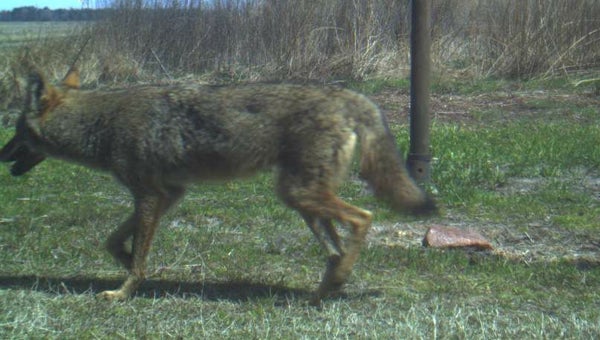NCWRC being bullied by animal rights organizations
Published 12:52 pm Monday, January 12, 2015

CONTRIBUTED
A hidden trail camera captured this image of a canine as it hunts food on private land in Tyrell County, N.C. Is it a coyote, a red wolf or a domestic dog? Should it be protected under the Endangered Species Act?
In their attempts to bully North Carolina’s hunters and fishermen, several noted international animal rights advocates, such as the Red Wolf Coalition, the Defenders of Wildlife and the Animal Welfare Institute, continue to try to shove the red wolves down the throats of the North Carolina Wildlife Resources Commission and the outdoor sportsmen of our state.
These groups find it difficult to accept the fact that their organizations have been backing the establishment of a known hybrid animal that has no business even being placed on the endangered species list in the first place.
Using the federal Endangered Species Act as a weapon to try and put an end to the sport of hunting is a tactic that is commonly used by animal rights activists to force their ideas on others, and apparently North Carolina’s outdoorsmen have about had enough of their bulling tactics.
When our legislature and the N.C. Wildlife Resources Commission recently decided to allow the hunting of the coyotes, 24 hours a day (except on Sundays), several of the animals known as red wolves were killed by gunshot and the new nighttime coyote hunters were blamed by the animal rightists.
Using their combined monetary resources, the animal rightists hired the Southern Environmental Law Center to sue every individual member of the N.C. Wildlife Resources Commission for having allowed the nighttime coyote hunting. The Federal Court responded by ordering that all coyote hunting be brought to an end in the five county area of eastern North Carolina that were designated as red wolf country.
Animal rights organizations, operating through the federal courts with the ESA as their banner, have offered to drop the suit against the N.C. Wildlife Resources Commission if certain conditions of their plan to promote the red wolf program are adhered to. North Carolina’s outdoorsmen are concerned that our Wildlife Commission is bowing to the pressure of the animal rightists and will accept their demands to keep from being sued. Their tactics are often referred to as “sue and settle attics.”
The amended rules would fulfill the requirements of a court order in regards to a lawsuit brought by the Southern Environmental Law Center on behalf of the Red Wolf Coalition, Defenders of Wildlife and the Animal Welfare Institute against the N.C. Wildlife Resources Commission. The suit alleged the Wildlife Commission violated the federal Endangered Species Act by allowing coyote hunting in Dare, Hyde, Beaufort, Tyrrell and Washington counties where an experimental reintroduction of the red wolf is occurring.
A court-ordered injunction issued in May halted coyote hunting in the five counties, except under extremely limited circumstances. The proposed rules will establish the process to allow conditional coyote hunting in the five counties.
In North Carolina’s other 95 counties, coyote hunting regulations allow coyote hunting on private land at any time, day or night, with no bag limit and on public land at night with a permit. Coyotes are found in all 100 counties of the state.
Last week the NCWRC held the first of three scheduled public hearings to determine how the sentiments of our outdoor sportsmen were regarding this proposed settlement with the animal rightists. At that hearing, 100 percent of the speakers attending in Columbia spoke in favor of the Wildlife Resources Commission’s taking a “stand and fight” tactic against the animal rightists proposed settlement.
There are two more of these NCWRC public hearings scheduled to listen to the views of sportsmen on the red wolf issue.
The N.C. Wildlife Resources Commission’s remaining two public hearings in January will receive comments on rules regarding conditional coyote hunting in the five-county red wolf reintroduction area in northeastern North Carolina and the designation of the red wolf as a state listed threatened species. The public hearings will begin at 7 p.m. on these dates and locations:
• Jan. 20 at Swain Auditorium, 200 East Church Street, Edenton, for permanent rulemaking and as part of the District 1 annual public hearing.
• Jan. 21 at the courthouse, 302 Broad Street, New Bern, for permanent rulemaking and as part of the District 2 annual public hearing.
As amended, the rule regulating coyote hunting, 15A NCAC 10B .0219, would prohibit all nighttime hunting of coyotes in the counties of Dare, Tyrrell, Hyde, Beaufort and Washington counties. Daytime hunting from a half hour before sunrise to a half hour after sunset would be allowed on private property with a coyote-hunting permit, which will be available at www.ncwildlife.org. Daytime hunting would be allowed on state-owned game lands with a special hunt permit. Hunters would be required to report all harvests.
An example of some of the comments that will be expressed at these public hearings is offered by Pamlico County noted conservationists Owen Lupton. With a good overview of the entire history of the red wolf here in North Carolina he states that, “The USFWS trapped the last remaining free roaming so-called red wolves in the late 1960’s and 70’s in east Texas and Louisiana. About 400 of these animals were trapped.
“Those 400 were culled down to 40-plus animals and again those animals were culled down to 14. They became the breeding stock for all of the so-called red wolves.
“In defense of the biologists involved at the time, they had no DNA testing available and so could only attempt to construct a red wolf from questionable taxonomic standards (i.e. what they thought a red wolf should look like).
“Today we know through extensive DNA testing that no discernable red wolf DNA is present in these animals. They are all hybrids possessing a third coyote and a quarter gray wolf DNA.
”In 1987, an experimental non-essential stocking of the so-called red wolf began on the Alligator River National Wildlife Refuge. Many promises were made in writing by the Unites States Fish and Wildlife Service (USFWS) on how these so-called wolves would be managed. For example these animals would be immediately removed from private property at the landowners request.
“Not only were the so-called wolves not removed, but 64 of these animals were actually released on private property without legal written agreements to do so. However the real crux of the matter is that we now know through DNA testing that the red wolf is in fact not a red wolf at all, but rather a hybrid cross of coyotes 75 percent DNA and gray wolf 25 percent DNA.
“The original intent of the Endangered Species Act was to preserve real species of endangered animals, not hybrids.
“After a $30-million investment over 28 years, it is clear that if such an animal as a true species called a red wolf ever existed historically, it has long since vanished.
“The program should be closed, USFWS should trap as many of the animals as possible and remove them, and those which remain should be treated the same as coyotes and be subject to removal by land owners and hunters before they further decimate small game and deer populations in eastern NC. These animals most certainly should not be granted threatened species protection in NC because they are a human engineered wannabe red wolf hybrid.
“These animals most certainly should not be granted threatened species protection in NC because they are a human engineered wannabe red wolf hybrid.”
Comments can be made online at www.ncwildlife.org/ProposedRegulations.aspx or by letter to N.C. Wildlife Resources Commission, 1701 Mail Service Center, Raleigh, N.C. 27699-1701. For more information on Wildlife Commission temporary rulemaking, go to http://www.ncwildlife.org/ProposedRegulations.aspx.





